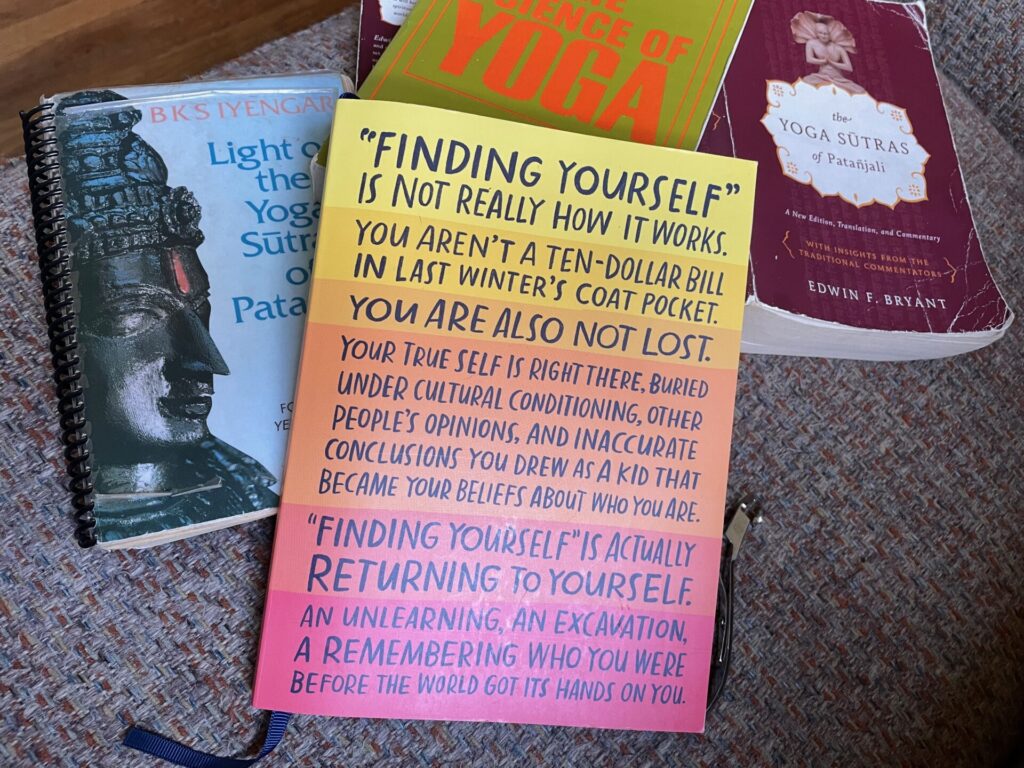Detachment in Every Moment

We are almost to the end of the third chapter in The Yoga Sutras of Patanjali. The last sutras we discussed (III.51-53) describe the last detachment of the yogi, give the last warning of not getting distracted from the ultimate goal, and gives the final integration (samyama) needed to take you to the final goal of yoga – ultimate spiritual freedom (kaivalya).
After all the previous and sometimes quite difficult and esoteric sutras describing all the different “naturally super powers” (vibhutis) that develop from the most external knowledge to the most subtle, these last few become oddly quite clear.
Yoga is a complete study of self on every level of our being, but in reality it can be looked at more as the knowledge and then detachment of all that is NOT self. Once all of the false or clouded impressions of our embodiment are known, we can see everything clearly, as the previous sutra recognizes, we become omniscient and omnipresent. However, that individual “i”-ness, the element of discernment that remains, is still a tether we must detach from in order to experience the unalloyed bliss of the soul itself – our true nature.
In this state even, there is still a possibility of backsliding if taken in by such immense knowledge, power, and bliss. We may walk in a realm rife with celestial wonders or feelings of pride of our attainments. If drawn into those temptations, the fall from such spiritual heights can still be a long and hard one. This is seen over and over again in immensely charismatic, powerful, and even spiritually developed individuals who in the end are drawn more to the powers they have experienced instead of sticking to the path of yoga or self-knowledge and ultimately to complete spiritual freedom. The cycle and discipline of yoga practice is needed at EVERY level, not just for the novice beginners, but also for those most developed, in order to avoid downfall and destruction.
So much of this boils down to being in the moment alone without the memory of the past or the hopes or worries of the future. “Time” is only the movement of moments. It exists for the individual as our minds attach to what has been and what we think will come – neither of which are actual reality. The past is gone and the future has not happened. True “life” and “knowledge” and “experience” can only occur within each present moment. We all know how difficult this practice can be if we have tried for even a few minutes to “stay in the present”. Close your eyes and stay with the awareness of your breath or even the pause between breaths and how long does that last? What other thoughts begin to creep in? What do I need to be doing after I am done sitting here? Who was that that made me mad yesterday? Etc…
We even see this in teaching Iyengar Yoga and knowing that most of our lives are full of movement. To get any person to “stay still” for a moment, to feel what the body is actually doing, to experience any emotion or sensation that pops up – comfortable or uncomfortable – is a challenge. As individuals we seek “comfort” and the ability to “move” forward or even backward out of the present experience. This presents itself so clearly when trying to teach beginner yoga students to stand in Tadasana (mountain pose) for just a breath or two.
The present moment is the space of every and all possibility. It is what opens us up to pure, unadulterated potential. It is truly the experience of our pure existence without attachment and distraction. This is the knowledge of a yogi.
The next three Yoga Sutras are the last in the third chapter. The following translations are from Light on the Yoga Sutras of Patanjali by BKS Iyengar.
III.54 – By this knowledge the yogi is able to distinguish unerringly the difference in similar objects which cannot be distinguished by rank, qualitative signs or position in space.
III.55 – The essential characteristic of the yogi’s exalted knowledge is that he/she grasps instantly, clearly and wholly, the aims of all objects without going into the sequence of time or change.
III.56 – When the purity of intelligence equals the purity of the soul, the yogi has reached kaivalya, perfection in yoga.
Our last meeting for this Yoga Sutra Discussion Group will be Sept 4 at 11:00am CST on ZOOM. Sign up for the link. After this last discussion on the current “First Sunday” schedule, we are hoping to encourage more participation as we begin from the first chapter of The Yoga Sutras of Patanjali in the Fall. Please let us know if you would like to participate, but a different day or time or format would work better for your schedule. Connect with Jennie any time at jennie@yogalacrosse.com.
